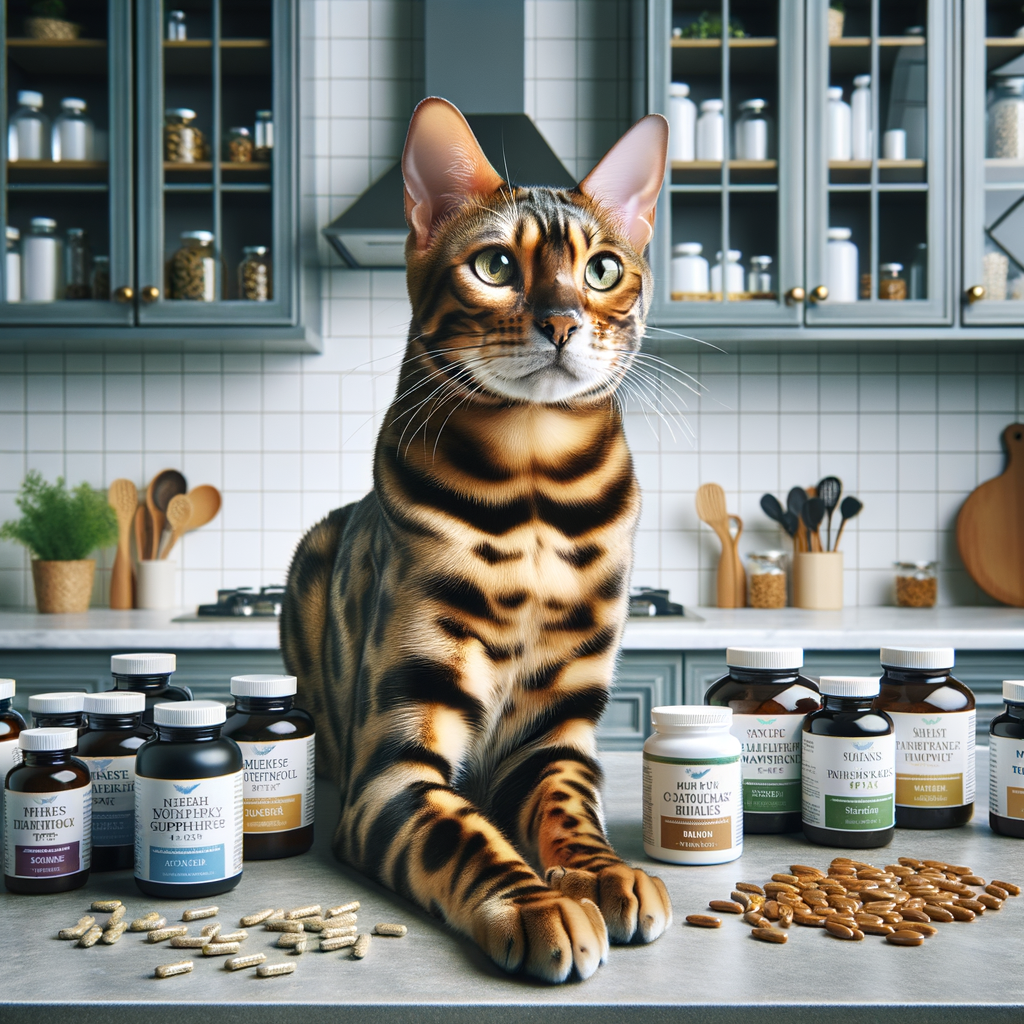
Introduction to Bengal Cat Supplements
Bengal cats are known for their playful nature and stunning coats. To keep them healthy, supplements can be very helpful. These supplements provide essential nutrients that might not be present in regular cat food. They help in maintaining a shiny coat, strong bones, and a healthy immune system.
Just like any other breed, Bengal cats can face specific health issues. Some common problems include:
- Joint Problems: Bengals are active and can sometimes suffer from joint issues.
- Heart Disease: Hypertrophic cardiomyopathy (HCM) is a heart condition that can affect Bengals.
- Digestive Issues: Bengals can have sensitive stomachs and may experience digestive problems.
By understanding these health issues, you can choose the right supplements to help your Bengal cat stay healthy and happy.
Essential Nutrients for Bengal Cats
Vitamins for Bengal Cats
Vitamins are crucial for keeping your Bengal cat healthy. They help with growth, vision, and the immune system. Here are some essential vitamins your Bengal cat needs:
- Vitamin A
Vitamin A is important for your Bengal cat’s vision and immune system. It also helps with skin health and growth. Cats cannot produce Vitamin A on their own, so it must come from their diet.
- Vitamin D
Vitamin D helps your Bengal cat absorb calcium, which is vital for strong bones and teeth. It also supports muscle function and the immune system. Cats get Vitamin D from their food, as they cannot produce it from sunlight like humans.
- Vitamin E
Vitamin E is an antioxidant that protects your Bengal cat’s cells from damage. It also supports the immune system and skin health. A diet rich in Vitamin E can help keep your cat’s coat shiny and healthy.
| Vitamin | Benefits | Sources |
|---|---|---|
| Vitamin A | Vision, immune system, skin health | Liver, fish oil, eggs |
| Vitamin D | Bone health, muscle function, immune system | Fish, liver, egg yolks |
| Vitamin E | Antioxidant, immune system, skin health | Plant oils, nuts, seeds |
Minerals for Bengal Cats
- Calcium
Calcium is crucial for Bengal cats. It helps build strong bones and teeth. Without enough calcium, your cat might face bone problems. Make sure their diet includes calcium-rich foods like fish and dairy.
Fun Fact: Did you know that calcium also helps with muscle function and nerve signaling?
- Phosphorus
Phosphorus works with calcium to keep bones healthy. It also helps in energy production. Bengal cats need a balanced amount of phosphorus in their diet. Too much or too little can cause health issues.
Tip: Meat and fish are good sources of phosphorus for your Bengal cat.
- Potassium
Potassium is important for your Bengal cat’s muscles and nerves. It helps maintain proper fluid balance in their body. A lack of potassium can lead to weakness and other health problems.
Example: Bananas and sweet potatoes are rich in potassium, but always consult your vet before adding new foods to your cat’s diet.
| Mineral | Benefits | Sources |
|---|---|---|
| Calcium | Strong bones and teeth, muscle function | Fish, dairy |
| Phosphorus | Bone health, energy production | Meat, fish |
| Potassium | Muscle and nerve function, fluid balance | Bananas, sweet potatoes |
Choosing the Best Supplements for Bengal Cats
Factors to Consider
When selecting supplements for your Bengal cat, it’s important to consider several factors to ensure their health and well-being. Here are the key points to keep in mind:
- Age of your Bengal cat:
The nutritional needs of Bengal cats change as they grow. Kittens, adults, and senior cats all require different types of supplements. For example, kittens may need extra calcium for bone development, while senior cats might benefit from joint supplements.
- Existing health conditions:
If your Bengal cat has any health issues, such as kidney disease or digestive problems, you should choose supplements that address these specific needs. Always consult with your vet before adding any new supplement to your cat’s diet.
- Dietary needs:
Bengal cats are known for their active and playful nature, which means they may have higher energy requirements. Ensure that the supplements you choose complement their regular diet and provide the necessary nutrients they might be missing.
By considering these factors, you can make informed decisions that will help keep your Bengal cat healthy and happy.
Reading Supplement Labels
When choosing supplements for your Bengal cat, it’s important to read the labels carefully. This helps you understand what you’re giving to your pet and ensures their health and safety.
- Ingredients to look for:
- Taurine: Essential for heart and eye health.
- Omega-3 fatty acids: Supports skin and coat health.
- Probiotics: Helps with digestion and gut health.
- Vitamins: Look for vitamins like A, B, and E for overall health.
- Ingredients to avoid:
- Artificial colors: These can cause allergies and other health issues.
- Preservatives: Chemicals like BHA and BHT are harmful.
- Fillers: Ingredients like corn and wheat can cause digestive problems.
- Sweeteners: Avoid xylitol as it is toxic to cats.
| Good Ingredients | Bad Ingredients |
|---|---|
| Taurine | Artificial colors |
| Omega-3 fatty acids | Preservatives like BHA and BHT |
| Probiotics | Fillers like corn and wheat |
| Vitamins (A, B, E) | Sweeteners like xylitol |
By paying attention to these ingredients, you can make better choices for your Bengal cat’s health. Always consult with your vet before adding new supplements to your cat’s diet.
Natural Supplements for Bengal Cats
Natural supplements can be very good for Bengal cats. They help improve their health without using chemicals. Here are some benefits:
- Boosts Immune System: Natural supplements can help Bengal cats fight off illnesses.
- Better Digestion: These supplements can make it easier for your cat to digest food.
- Shiny Coat: They can make your cat’s fur look shiny and healthy.
- More Energy: Natural supplements can give your Bengal cat more energy to play and explore.
Examples of Natural Supplements
There are many natural supplements you can give to your Bengal cat. Here are some examples:
- Fish Oil: This is great for your cat’s skin and coat. It also helps with brain health.
- Probiotics: These help with digestion and keep the gut healthy.
- Turmeric: This spice can reduce inflammation and is good for joints.
- Spirulina: This is a type of algae that boosts the immune system and provides many vitamins.
Bengal Cat Dietary Supplements
Supplements for Bengal Cat Coat Health
Ensuring your Bengal cat has a shiny and healthy coat is important. Here are some key supplements that can help:
- Omega-3 fatty acids: Omega-3 fatty acids are essential for maintaining a healthy coat. They help reduce inflammation and can make your Bengal’s fur soft and shiny. You can find Omega-3 in fish oil supplements. According to Wikipedia, Omega-3 fatty acids are crucial for overall health.
- Biotin: Biotin, also known as Vitamin B7, is another important supplement for coat health. It helps strengthen the hair and nails of your Bengal cat. Biotin can be found in various cat foods and supplements. A healthy dose of biotin can prevent hair loss and promote a thick, luxurious coat.
Adding these supplements to your Bengal cat’s diet can make a noticeable difference in their coat health. Always consult with your vet before introducing new supplements to ensure they are safe and beneficial for your pet.
Immune Support for Bengal Cats
Keeping your Bengal cat’s immune system strong is crucial for their overall health. Here are some key supplements that can help:
- Probiotics: Probiotics are good bacteria that help keep your Bengal cat’s gut healthy. A healthy gut means a stronger immune system. Studies show that probiotics can reduce the risk of infections and improve digestion. You can find probiotics in special cat foods or as separate supplements.
- Antioxidants: Antioxidants help protect your Bengal cat’s cells from damage. They fight off harmful molecules called free radicals. Vitamins C and E are common antioxidants that can boost your cat’s immune system. Including antioxidant-rich foods or supplements in your Bengal cat’s diet can help them stay healthy and active.
| Supplement | Benefit |
|---|---|
| Probiotics | Improves gut health and boosts immune system |
| Antioxidants | Protects cells from damage and strengthens immune system |
Adding these supplements to your Bengal cat’s diet can make a big difference in their health. Always consult your vet before starting any new supplement regimen.
Conclusion: Ensuring Your Bengal Cat’s Health with the Right Supplements
Ensuring your Bengal cat gets the right supplements is crucial for their overall health. By understanding their unique needs and choosing high-quality supplements, you can help your Bengal cat live a happy and healthy life. Remember, a well-balanced diet combined with the right supplements can make a significant difference in your cat’s well-being.






